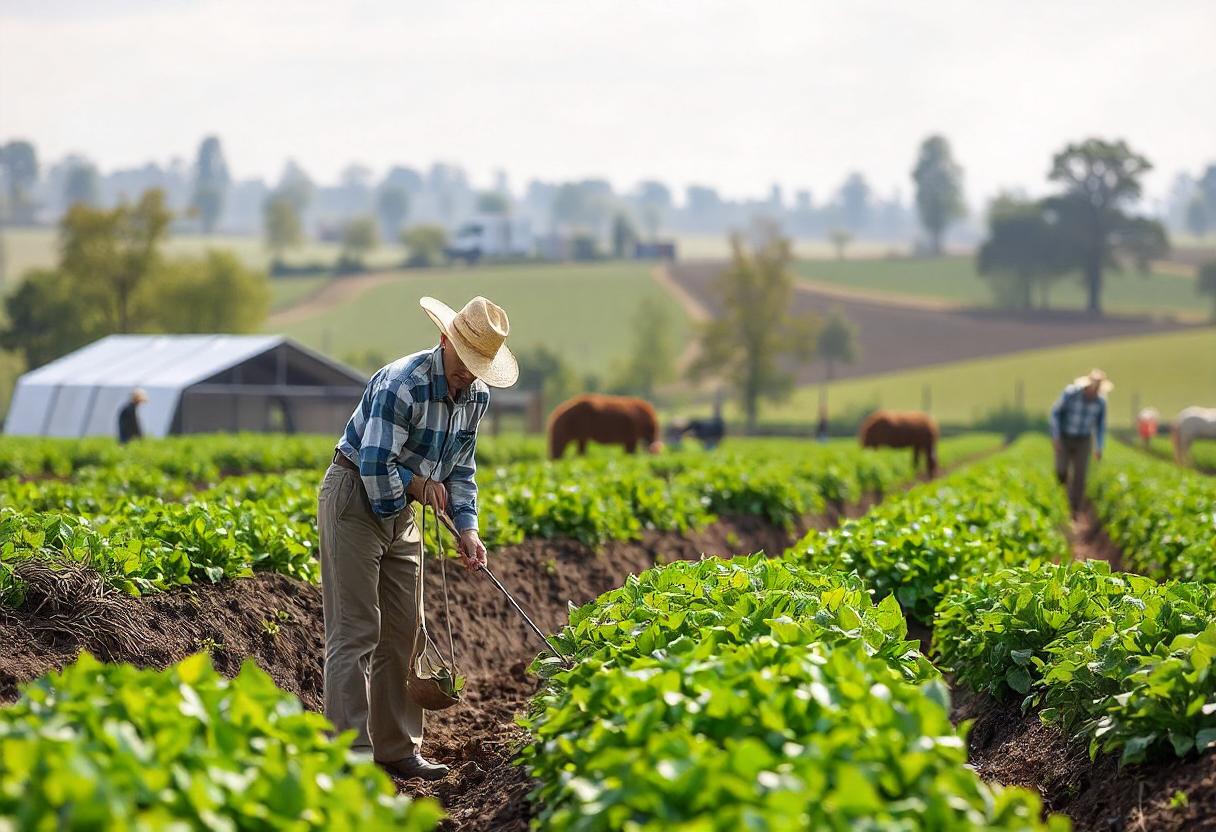
Introduction
Sustainable farming, also known as sustainable agriculture, is a holistic approach to agriculture that aims to balance environmental health, economic profitability, and social equity. It seeks to meet current food needs without compromising the ability of future generations to meet their own needs. This method integrates various practices designed to enhance productivity while minimizing harm to the environment and society.
Principles of Sustainable Farming
- Environmental Health
- Soil Health: Sustainable farming prioritizes maintaining and enhancing soil fertility through practices such as crop rotation, cover cropping, and reduced tillage. Healthy soil supports plant growth, reduces erosion, and helps sequester carbon.
- Water Conservation: Efficient water use is critical. Techniques like drip irrigation, rainwater harvesting, and maintaining wetlands help conserve water and ensure its availability for future use.
- Biodiversity: Promoting a diverse range of crops and animals helps build resilience against pests and diseases, enhances ecosystem services, and improves soil health.
- Economic Viability
- Cost Efficiency: Sustainable farming aims to reduce costs through practices that lower dependence on expensive inputs like synthetic fertilizers and pesticides. Instead, it emphasizes the use of natural resources and local materials.
- Market Access: Farmers benefit from access to markets that value sustainably produced goods. This includes organic certification, local farmer’s markets, and community-supported agriculture (CSA) programs.
- Long-term Profitability: By focusing on practices that preserve resources and reduce environmental impact, sustainable farming ensures long-term productivity and profitability.
- Social Equity
- Fair Labor Practices: Sustainable farming supports fair wages and working conditions for farm workers. It promotes humane treatment and provides safe working environments.
- Community Engagement: Engaging with local communities helps align farming practices with community needs and values. This can involve educational outreach, local partnerships, and supporting community food systems.
- Cultural Preservation: Sustainable farming often respects and incorporates traditional agricultural practices and knowledge, contributing to the preservation of cultural heritage.
Key Practices in Sustainable Farming
- Crop Rotation and Diversification
- Rotating crops helps prevent soil depletion and reduces the risk of pests and diseases. Diversifying crops also enhances biodiversity and soil health.
- Organic Farming
- Organic farming avoids synthetic chemicals and GMOs, focusing on natural inputs and methods. This includes composting, biological pest control, and natural fertilizers.
- Agroforestry
- Integrating trees and shrubs into agricultural systems can provide multiple benefits, such as improved soil structure, enhanced biodiversity, and additional income from timber or fruit.
- Permaculture
- Permaculture designs agricultural systems that mimic natural ecosystems. It emphasizes energy efficiency, waste reduction, and the creation of self-sustaining environments.
- Conservation Tillage
- Reducing or eliminating tillage helps maintain soil structure, reduces erosion, and enhances water retention. This practice also sequesters carbon in the soil.
- Integrated Pest Management (IPM)
- IPM combines biological, physical, and chemical methods to manage pests in an environmentally friendly way. It minimizes the use of harmful pesticides and focuses on long-term pest control.
- Water Management
- Techniques like drip irrigation, mulching, and rainwater harvesting optimize water use and reduce waste. These practices help conserve water resources and improve crop yields.
- Renewable Energy
- Utilizing renewable energy sources such as solar and wind power can reduce the carbon footprint of farming operations and lower energy costs.
Challenges and Solutions
- Economic Challenges
- Initial costs for implementing sustainable practices can be high. Solutions include government subsidies, grants, and technical support to help offset these costs.
- Knowledge and Training
- Farmers may lack knowledge or training in sustainable practices. Providing educational resources, extension services, and training programs can address this gap.
- Market Access
- Sustainable products may face challenges in reaching broader markets. Developing certification systems, enhancing consumer awareness, and creating local markets can help improve access.
- Climate Change
- Climate change poses risks to farming systems. Sustainable farming practices, such as carbon sequestration and adaptive management strategies, can mitigate some of these risks.
Sustainable farming represents a crucial shift towards a more balanced and responsible approach to agriculture. By integrating practices that protect the environment, support economic viability, and promote social equity, sustainable farming ensures that we can meet current food needs while preserving resources for future generations. As awareness and implementation of sustainable practices grow, the potential for a more resilient and equitable food system becomes increasingly attainable.